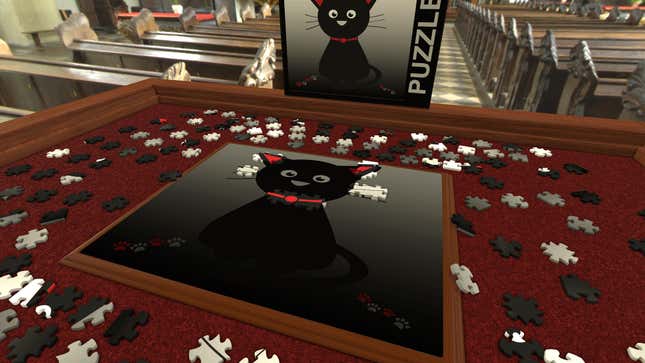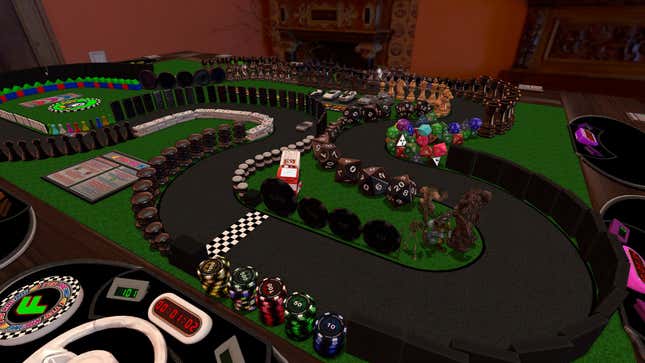
It feels like familiar territory. A community moderator for the video game Tabletop Simulator handed out temporary and permanent bans for talking about queerness in the game’s global text chat and Discord. This upset a portion of the playerbase, who then took to Twitter and Steam reviews to express their frustration, accusing the game’s developers and community moderators of being transphobic. Now, a backlash to the backlash has prompted the creation of dozens of “positive” Steam reviews laced with transphobic screeds, an effort by some players to show support for the policy. I don’t know what else to say anymore, other than that I am tired of reading people talk about wanting me dead.
However, being queer and alive in a society that—despite what progress there has been—is built around policing identity, means that regardless of my desires I will be subjected to people talking about my death. At this point, it is a real part of the culture of Online, one that only increases in prominence as the wider world learns about the existence of trans people. From major authors, to the perverts in my DMs who want to fuck me as much as they want to kill me, being queer online is a bit of a nightmare right now. Leaving is rarely an option though, which is what makes the Tabletop Simulator situation so frustrating.
Tabletop Simulator is an online tool that virtually simulates, well…a tabletop. It is used by board game players, TTRPG players, and war gamers everywhere to engage in their favorite hobby long distance. All things considered, it’s a pretty effective tool for playing board games remotely, significantly enhanced by the silliness that comes from physics modeling. However, finding new people to play board games with can be a struggle, even with all the internet at your command. Berserk, the game’s developer, hoped to solve this problem with a global chat where players could look for other people to join them. That global chat has since been disabled.
The short version of the story is that a player had been repeatedly banned for talking about her gay- and trans-ness in the game’s group-finding-oriented global text chat, which led to her experimenting with the game’s auto-moderation system. She ended up realizing that the words “gay” and “trans” resulted in a nigh-instant ban. The words “straight” and “cis” did not. When she complained, one of the game’s moderators claimed that she had breached a policy regarding “family friendly” content. Later explanations claimed that the auto-moderation policy was designed to prevent derogatory use of the words. At one point, the moderator in question equated discussions of gay and trans people to “political” and “fetish” content, something which they have since apologized for.
Regardless of intent, the resulting bans became extremely frustrating to a portion of Tabletop Simulator’s community—this frustration has since boiled over onto Twitter and into the game’s Steam reviews. The developers have since apologized and disabled global chat, but many players remain unsatisfied and the game’s Steam reviews have turned into a culture war nightmare factory.

Despite moderators’ claims to the contrary, there is a genuine utility to discussing identity in public forums even when you’re just looking for people to play with. The reality is that a lot of queer people really struggle to find community offline—this happens for a variety of reasons—which leads them to seek more community and security online. The pandemic is one of these factors. Many people have come to terms with their queerness in the midst of a global quarantine, during which building offline community is extremely difficult. The online legacy of websites like Tumblr is another. Many people encountered their own queerness, and that of others, exclusively online. This creates an idea of community that surrounds individuals’ interests and online performances of acceptance. Additionally, increasing awareness of trans people has also led to a global spike in vocal transphobia, further disincentivizing offline community building through fear.
This desire for online community and security is compounded by the fact that Online is permeated with assholes. Any marginalized person who just so happens to be identifiable by voice can attest to this. Joining any online community, a digital board game group for example, only to find it filled with rampant homophobia and racism or for your fellow players to immediately harass you—is a common occurrence. So common, in fact, that clearly stating one’s identity before joining a group can be a legitimately useful safety mechanism.
Which is all to say that sweeping policies on banned terms (particularly those that marginalized people use to self identify), even in a global chat oriented around finding people to play with, are a pretty bad idea. This is especially true in the face of the game’s positive Steam reviews, which are filled with transphobic screeds and dog-whistles from players whose hour-count ranges between 25 minutes and several hundred hours. These hour counts indicate a grim reality, that transphobic assholes have been a part of Tabletop Simulator’s community for a long time—even if they are a minority within that community.
Looking through the game’s Steam reviews, I learned a bunch of new and terrible facts and acronyms, all of which were repeatedly plastered through the “Positive” review section. “YWNBAW,” for example, is shorthand for “You will never be a woman,” a phrase which appears well over half a dozen times in both longform and abbreviated iterations. If you’re wondering why “41%” is being shoehorned into reviews, and into the Twitter replies of prominent trans folks online, it is the reported suicide rate of trans people. I didn’t want to know this either! And yet here we are. This is the community that queer people are asked to wade into when looking for a group in public settings.
Part of the grim reality of living while queer is acknowledging the fact that there is a portion of the world’s populace who wants you dead. The first time I really felt “out” was when a man in Walmart looked like he wanted to kill me. I don’t know if he did, or if he was looking at something else behind me that he felt shouldn’t exist. Either way, it totally changed my relationship to safety, community, and presentation. I realized that I would never be able to make the people who hated me happy, I would never be quiet or acceptable enough—which meant there was nothing left to hold me back.
In the face of communities and moderation policies which work to alienate queer people, intentionally or otherwise, we are left with the very real question of what to do. The answer being that we have to forge new communities, intentionally designed around actually fostering senses of belonging for the people therein. Extant structures and community practices will not save us, which means taking the time to develop new, person-centric policies in our own communities.
The worst parts of Tabletop Simulator’s community have shown their teeth, which means there is now a real opportunity and need to build something new. I’m excited to see what it is.

